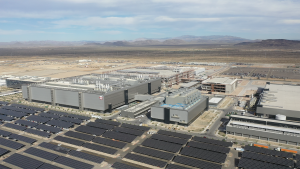TSMC and TSMC Arizona marked Earth Day by announcing its commitment to the Science Based Targets Initiative (SBTi,) underscoring its dedication to addressing the pressing challenges of climate change. In line with SBTi, TSMC is collaborating with partners to achieve its environmental sustainability goals, embarking on an ambitious and comprehensive carbon reduction path encompassing direct, indirect and value chain emissions.
To drive sustainable growth, TSMC has outlined a blueprint for achieving net-zero emissions. Key milestones include peaking carbon emissions in 2025, reducing them to 2020 levels by 2030 with a target of using 60% renewable energy for global operations (RE60), achieving RE100 by 2040, and reaching net-zero emissions by 2050. Using 2025 as a baseline, TSMC commits to achieving absolute reduction targets for scope 1, 2, and 3 emissions aligned with the SBTi Corporate Net-Zero Standard within the next decade.
“Corporate engagement is one of the key drivers of change in the global pursuit of environmental commitments and low-carbon transformation,” stated Dr. C.C. Wei, TSMC Chairman and CEO, and ESG Steering Committee Chairman. “TSMC works closely with our supply chain partners and stakeholders to advance green initiatives and develop innovative energy-saving and carbon reduction technologies to achieve net-zero emissions. We are committed to setting ambitious goals and taking action to strive for a sustainable future.”
TSMC actively reduces Scope 1 direct greenhouse gas emissions by updating and installing local scrubbers and utilizing carbon-neutral natural gas. As of April, TSMC has earned its 53rd LEED (Leadership in Energy and Environmental Design) Gold or higher certification, making it the semiconductor industry leader in certified building area. TSMC’s overseas operations have achieved net-zero emissions for Scopes 1 and 2 since 2022.
TSMC Arizona has installed the same type of scrubbers to reduce the Scope 1 emissions. TSMC also installed Low Nitrous Oxide burners on our Volatile Organic Compound (VOC) abatement systems. TSMC Arizona has also applied for LEED Gold certification.
To address Scope 2 indirect energy emissions, TSMC became the first semiconductor company to join the global RE100 initiative for 100% renewable energy consumption. In 2023, TSMC accelerated its RE100 timeline, moving the target from 2050 to 2040, while expanding renewable energy usage and diversifying supply sources. The Company’s renewable energy usage surpassed 14% in 2024, while consistently achieving 100% renewable energy consumption across global offices and oversea sites, steadily progressing towards the RE60 medium-term target by 2030.
TSMC Arizona has installed 14.5MW of solar panels, and purchased Renewable Energy for the remainder of the power consumption. The solar panels provide power equivalent to what we be required to provide power to 2,200 homes.
To reduce Scope 3 value chain emissions, TSMC pioneered an innovation model with a 20-year joint procurement agreement for 20,000 GWh of renewable energy, securing stable prices for suppliers and TSMC’s subsidiaries and lowering adoption barriers. In 2024, TSMC launched a supply chain carbon reduction subsidy project to fund local Tier-1 raw material suppliers in upgrading, replacing, or installing new equipment to enhance emission reduction efforts. This initiative aims to achieve an estimated reduction of 450,000 metric tons of carbon emissions—equivalent to the annual carbon sequestration capacity of 45,000 hectares of forest.
To accelerate the green transformation of the semiconductor supply chain, TSMC is partnering with major emission contributors to sign the TSMC Greenhouse Gas Reduction, Emissions Elimination & Neutrality (GREEN) Agreement for suppliers starting in 2025. Over 50 suppliers have signed, representing nearly 90% of TSMC’s supply chain carbon emissions. The goal is to achieve RE85 for production in Taiwan and RE100 for overseas production of products supplied to TSMC by 2030. Additionally, aim for a carbon reduction target aligned with Science-Based Targets (SBT) initiatives by 2035.
TSMC offers industry-leading semiconductor process technology with superior performance and energy efficiency, enabling more efficient Information and Communication Technology (ICT) and smart applications. According Industrial Technology Research Institute’s estimates, by 2030, every unit (kWh) of electricity TSMC uses in production for HPC-related semiconductor products can save 6.8 units globally, demonstrating the impact of TSMC’s products and environmental value.
TSMC acts on its “ESG Policy” and “Environmental Protection Policy.” Guided by the principle of “beginning with the end in mind,” TSMC dynamically adjusts or sets more aggressive carbon reduction paths by annually reviewing target achievement, proactively addressing climate change challenges.
The SBTi is a global, collaborative effort that provides companies and organizations with a framework to set greenhouse gas emission reduction targets in line with the latest climate science. The initiative aims to help companies transition to a low-carbon economy by ensuring their targets are consistent with the level of decarbonization required to keep global temperature increase below 1.5°C or well below 2°C compared to pre-industrial levels, as outlined in the Paris Agreement.













